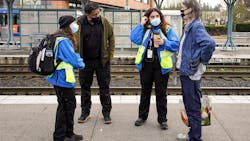Safety response team works to create safe, welcoming environment on TriMet
TriMet’s Safety Response Team is on the transit system now providing outreach to those who need it, including carrying backpacks filled with basic provisions to hand out and booklets containing information about social services.
As part of TriMet’s Reimagining Public Safety on Transit efforts, this unarmed team attempts to connect people in and around the system with community-based resources while discouraging inappropriate behavior.
Taking root last September when hiring for the team began, it’s made up of 24 members who work together in smaller groups. They focus on helping people with their needs, whether that’s providing conflict resolution, directing them to community services, giving first aid or reporting serious incidents to emergency responders.
Their first few months were spent becoming familiar with TriMet’s transit system and receiving their initial training on public safety, treating people with fairness and compassion and assessing people’s needs.
Building trust and a safe environment
Members of the Safety Response Team come from diverse backgrounds. Some have multiple master’s degrees, while others have lived experience such as having been houseless at one point.
“The large goal is to make the TriMet system a safer, cleaner, more inclusive place for everybody,” said Safety Response Team Field Supervisor Beverly Herfosillo. “When we meet people who require a little bit more assistance, we try to assess their needs individually and refer them to different resources. We most commonly come into contact with people who suffer from houselessness, mental illness or addiction issues, and we’re referring to places across town, like detox centers.”
Safety Response Team members have a variety of responsibilities, including:
- Attempt to connect riders in need to social services.
- Create a welcoming, inclusive and safe environment for everyone, including TriMet staff.
- Reduce the number of 911 calls for non-emergencies.
- Provide emergency supplies to those who need them.
Since TriMet began these efforts to Reimagine Public Safety on Transit, the agency has been listening to and working with the community to develop a program that best serves the most people. Between July and November 2020, TriMet received more than 13,000 survey responses, supported 300 one-on-one interviews and engaged 271 people in 31 focus groups. The Safety Response Team was one of the outcomes born of these efforts.
Ongoing training
TriMet says it values equity and inclusion and emphasizes treating everyone with dignity and respect. For the Safety Response Team and others working to make transit a welcoming place, training is an important way to help hone skills and improve insights into rider behavior.
Before spring ends, all front-line staff and contractors, more than 1,000 employees in total, will have received training in de-escalation. TriMet is also soliciting proposals for community-based training. TriMet plans to fund 10-15 of these trainings around cultural humility, supporting non-English-speaking riders, de-escalation and more to continue guiding front-line safety and security staff. This work will enable TriMet to continue making the transit system safer and more welcoming for all.

